This easy step-by-step tutorial is all you need to make the best preserved lemons at home! You can use them to add brightness, tang, and flavor to everything from your lunch sandwiches to stews, tagines, and more!
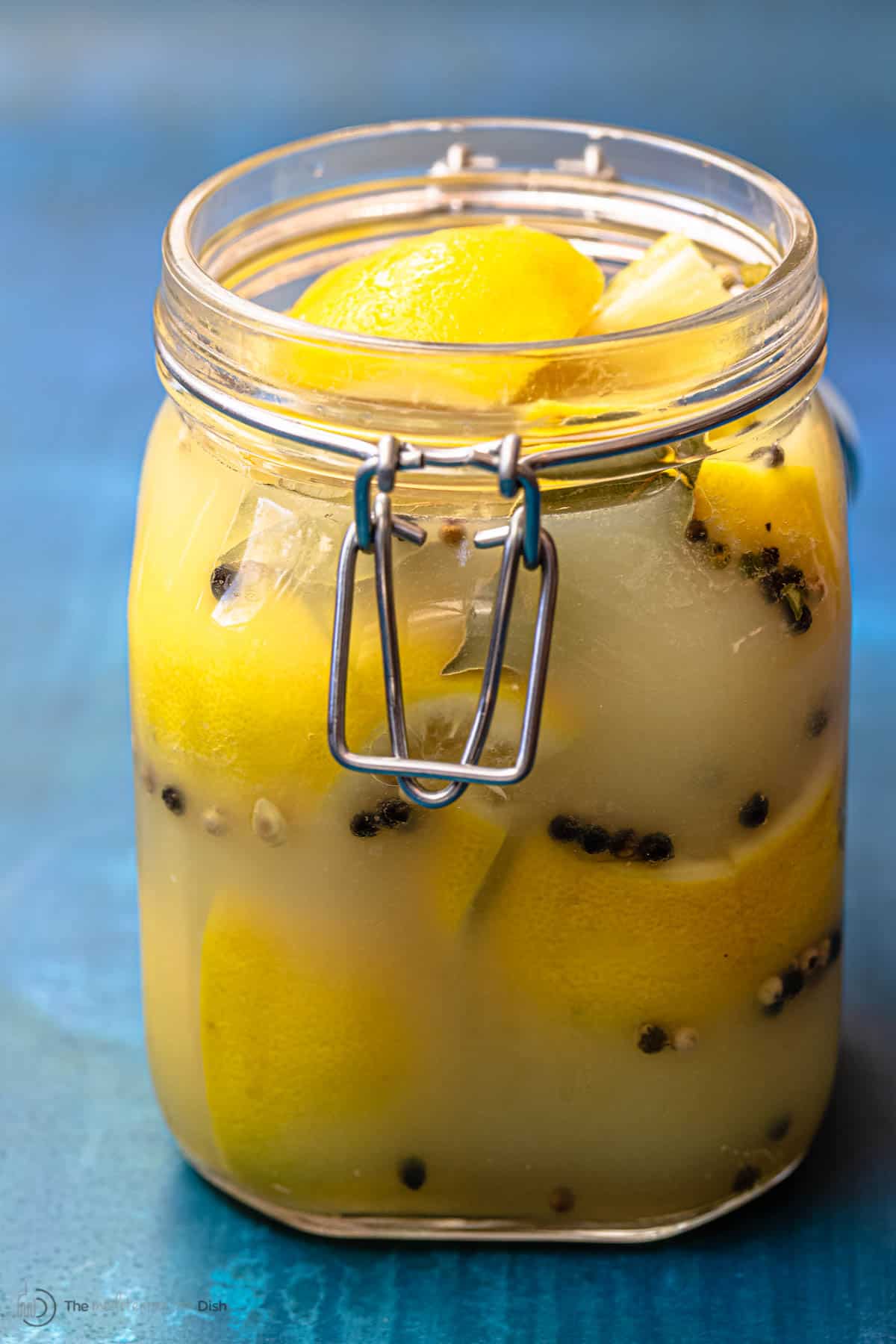
Growing up in Egypt, all sorts of pickles showed up on the dinner table. They were no less important than dad’s lazy tomato and cucumber salad or the tahini sauce we drizzled on everything from falafel to kofta. I loved pickled cucumber and lemons most though.
Preserved lemons have long been a part of Mediterranean and Middle Eastern cooking, although most people associate them with North African, and particularly Moroccan cuisine, and the famous chicken tagine.
Here in the States, depending on where you live and how much you’re willing to pay, you may be able to pick up a jar of pickled lemons at a specialty grocery store. Or you may find them at the olive bar next to things like pickled cucumber and marinated artichoke hearts and pickled cucumbers.
But, preserved lemons are super easy and far cheaper to make at home. They’ll take only 20 minutes of work and a handful of familiar ingredients. The hard part is in waiting. Once you pickle your lemons, it will take 3 to 4 weeks before you can use them. But the wait is so worth it!
What do preserved lemons taste like?
When preserving lemons, you are essentially pickling them with lots of kosher salt and lemon juice. As they sit in the pickling jar, the lemons will gently deflate and soften. Their strong tartness will mellow, but salt-preserved lemons will taste bright and citrusy.
What kind of lemons are good for preserving?
Since you’ll be eating the entire fruit, I recommend buying organic Eureka lemons (regular lemons) that have not been sprayed or treated with chemicals. Select ones that are heavy for their size with thin fine-textured peel and dep yellow color. Meyer lemons are also a great option, since their thinner skins are not very bitter.
How to make preserved lemons
- Scrub the lemons clean
Clean the lemons very well by scrubbing them under running water. - Cut the lemons
Trim 8 large lemons on the top and bottom by cutting about 1/4-inch on each side. From there, stand the lemons flat on a clean cutting board. Keeping the lemons attached at the bottom end, cut each lemon into quarters part-way through.
- Soak the lemons in lots kosher salt and little sugar and refrigerate for 1 day
Transfer the lemons to a large bowl. Prepare 1/2 cup of kosher salt and 2 tablespoons of sugar. Open up the lemons at the top and stuff each with plenty of the salt and sugar mixture, then roll them around in whatever remains of the salt and sugar. Cover the bowl with plastic wrap and refrigerate overnight and up to 24 hours. - Transfer to a sterilized canning jar and add peppercorns, bay leaf, and lemon juice
The following day, the lemons will have released some juice. Transfer the salted lemons and their juices to a large sterilized canning jar. Press the lemons down so firmly into the jar. Add a couple tablespoons of pepper corns and a few dry bay leaves. Add fresh lemon juice to fill the jar and cover the lemons (you’ll use juice of another 8 lemons or 2 1/2 cups of fresh lemon juice). Be sure to submerge the lemons so that the lemon juice covers the very top). - Seal and refrigerate for 1 month
Now, cover the jar tightly and refrigerate for 3 weeks and up to 1 month before consuming. The lemons will soften and mellow as they sit in the pickling liquid. - Salt-preserved lemons will keep in the fridge for up to 6 months.
What are preserved lemons good for?
Pickled lemons are often used in North African cooking to add brightness and flavor to stews, soups and more. They give a bright burst of flavor that’s delicious with fish, like with our stuffed salmon recipe.
You can also use some in place of lemon slices in my Chicken Tagine recipe. You can also cut up tiny bits and add them in small amounts to things like Moroccan lamb stew, vegetable tagine, or lentil soup.
Pickled lemons can transform your lunch sandwiches; just add them as you would any pickled vegetables. You can also slice them up and toss them with some roasted vegetables, or add them as a side next to anything from spatchcock chicken to salmon kabobs, shawarma salad bowls…the possibilities are endless!
Or, if you’re using as a garnish and you’re short on time, fried lemons work as a substitute.
Do preserved lemons go bad?
Properly stored in the fridge, salt-preserved lemons can keep for a good 6 months. It is important to use a good canning jar with a tightly closed lid, and make sure the lemons are well submerged in the lemon juice. Some sources say they will last a good year, that may be, but I like to play it safe. Also, we use them so regularly over here that they do not last very long.
Tools you’ll need
- Large mixing bowl
- A tight-lid canning jar that should fit the lemons snuggly (I used a 2-liter jar) The jar you choose should fit all the lemons snuggly.
Other condiments you may like
- Roasted Peppers (2 ways)!
- Whipped Toum (4-ingredient garlic sauce)
- Homemade harissa
- Moroccan Fish Recipe
You may also enjoy 50+ Top Mediterranean diet recipes. For all recipes, visit us here.
Preserved Lemons Recipe
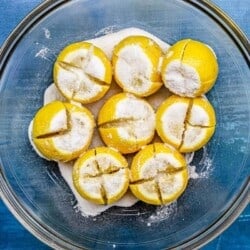
Ingredients
- 8 large lemons
- ½ cup Kosher salt
- 2 tablespoons of sugar
- 2 tablespoons pepper corns
- 4 to 5 dry bay leaves
- Fresh lemon juice of 7 to 8 lemons, (about 2 1/2 cups of fresh lemon juice)
Instructions
- Cut about 1/4 -inch of the top and bottom of the lemons. Cut each lemon into quarters part-way through so that they remain connected at the bottom
- Transfer the lemons to a large bowl and toss well with the salt and sugar. Open up the lemons some and stuff them with the kosher salt and sugar mixture. Cover the bowl with plastic wrap and refrigerate overnight and up to 24 hours, the lemons will release some juice.
- The next day, transfer the lemons and their juices to a large sterilized canning jar. Press them down firmly into the jar. Add the pepper corns and bay leaves. Top with fresh lemon juice (your goal is to submerge the lemons in the juice).
- Seal the jar shut and store in the fridge for 3 weeks to 1 month before consuming.
Video
Notes
- Jar Options: I used this 33.75-ounce jar to fit all the lemons. Note that lemon sizes will vary, so the important thing is to select a large jar with an air-tight lid that will fit the lemons snuggly. You can use a couple of smaller jars too, that will work.
- How long will salt-preserved lemons last in the fridge? If properly stored in the fridge, they will keep for up to 6 months.
- Preserved lemons will be mellow but intense with flavor…their flesh and skins are tender and edible.
- The serving size here is 1/2 preserved lemon.
- Visit Our Shop to browse quality Mediterranean ingredients including extra virgin olive oils and spices.


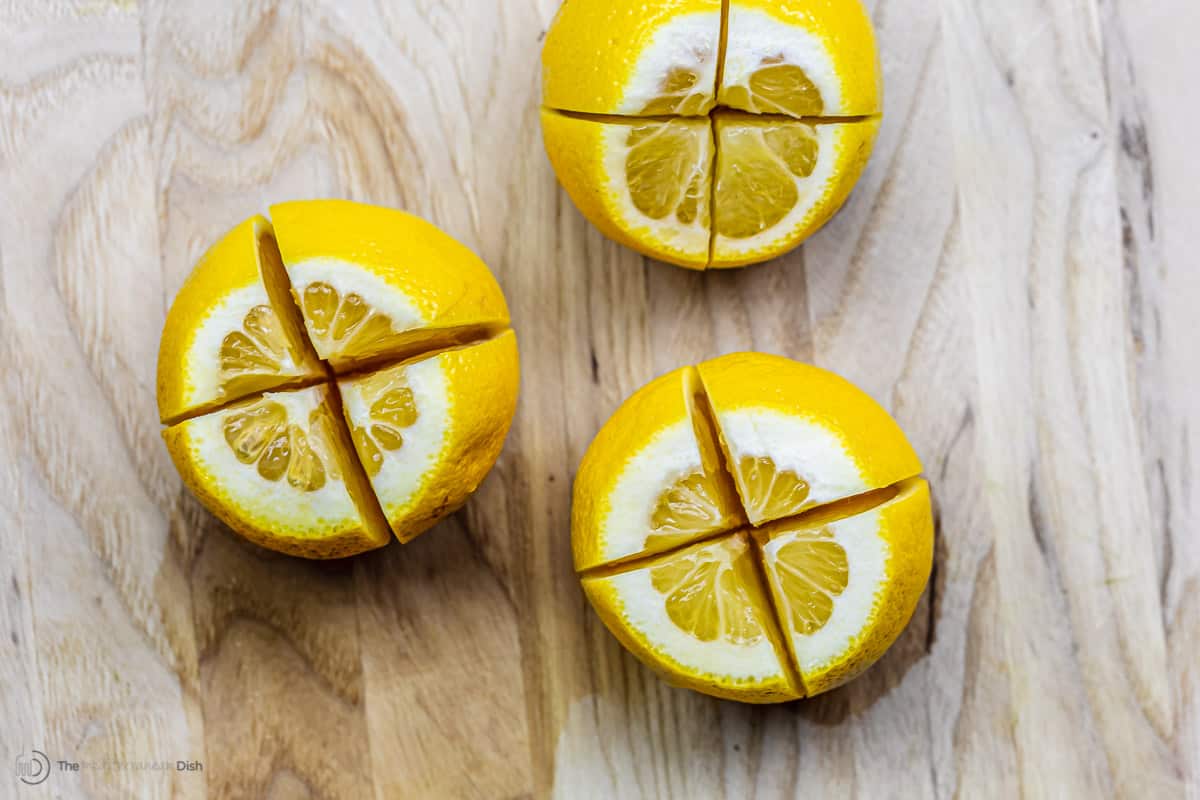
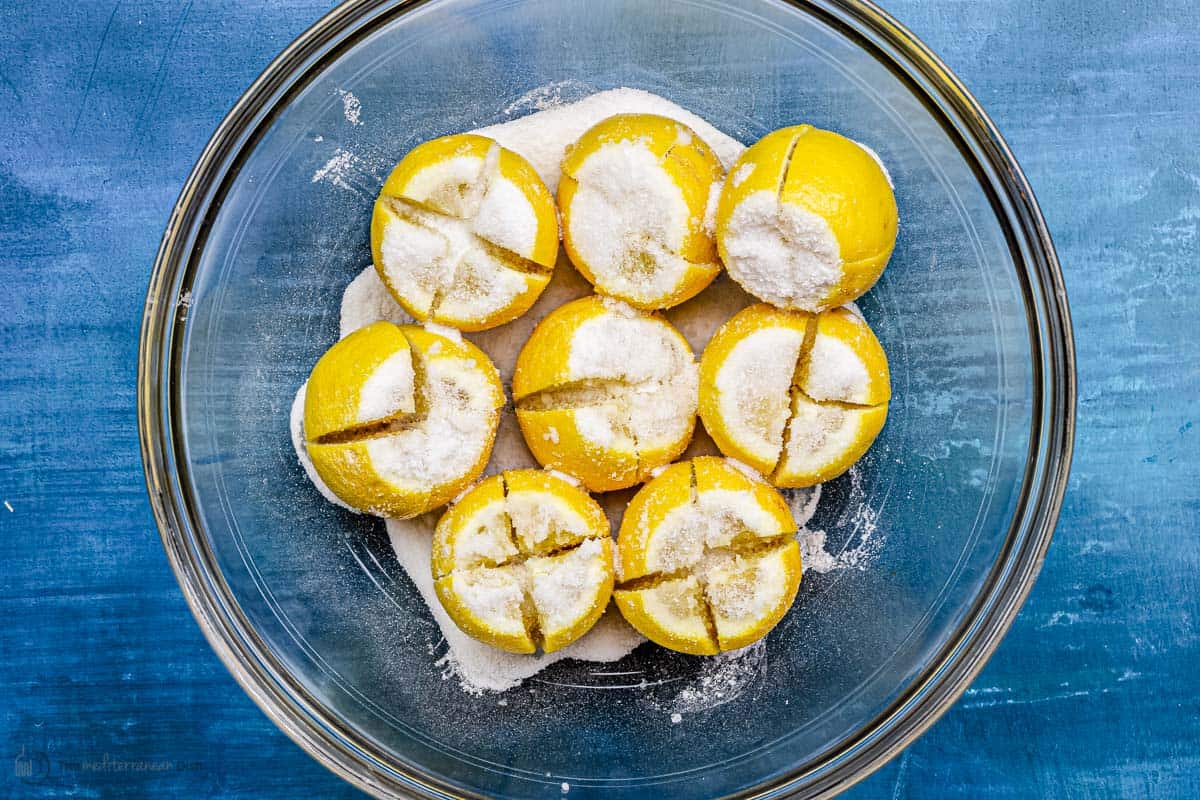
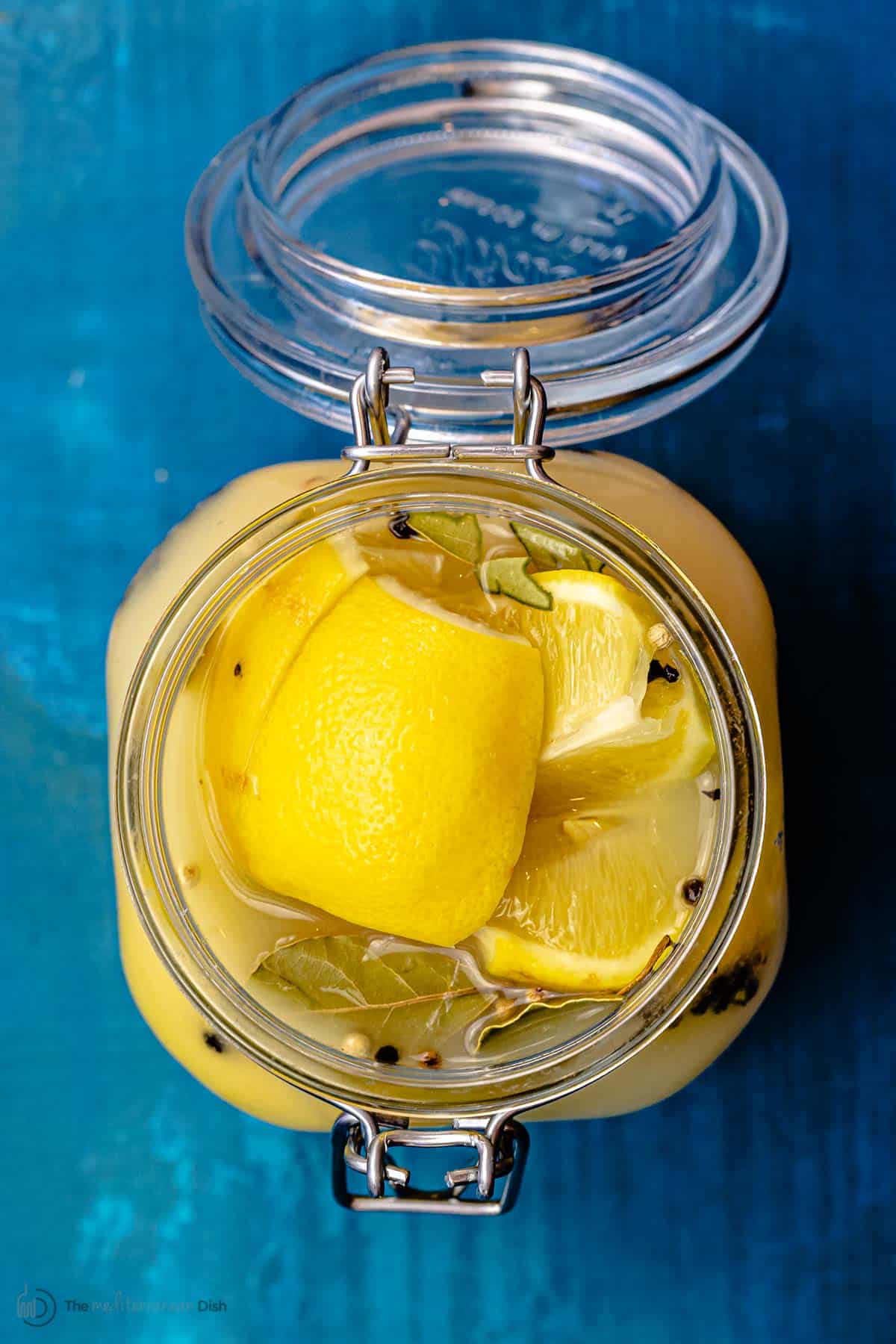
I tried many of your recipes and they’re so healthy and delicious!
Thanks for sharing!
At the start my lemon juice covered the lemons, but after a few weeks, it seems that the juice has been absorbed by the lemons in the jar when I have turned the jar over each day. Is it still safe to now store these lemons in the fridge for the 6 months and use in my cooking and food?
If I don’t have enough lemon juice can I use commercially made lemon juice from the supermarket?
Hi, Ann! We really recommend sticking with fresh lemon juice here for the best results.
I made these in early May and used them for a few dishes in June. They’re incredibly easy to make. I used them in Moroccan flavored lamb meatballs with new potatoes and also in a chicken dish. It’s a game changer. The flavor is tangy and the umami element is delightful. I’ve read other reviews and plan on blending them up and using in soup. Highly recommend this recipe!
Hi Cynthia, Devin here from the Mediterranean Dish team. Thanks so much for writing in! So happy you loved this recipe and your planning ahead payed off :). My favorite is to swap out the fresh lemon in this Moroccan Fish recipe. Happy cooking!
Love the preserved lemon recipe! I am going to try it today. Thank you.
Hi! We made the lemons a month ago and some juice absorbed and they aren’t quite fully covered by the liquid. There is also a white puffy looking residue around the top. Is this ok? I will check for mold but I don’t see any unless the white fluffy bits are mold.
Hi, Meagan. If the lemons weren’t fully covered and there seems to be an odd residue, I’d dispose of them just to be on the safe side.
Although I have come to love lemons in everything I had forgotten about a batch of preserved lemons I made a few months back. As I was searching your recipes (as I often do) I ran across one where you mentioned blending the lemon preserves. I pulled them out, strained out the seeds, used my emersion blender, and blended them up well. Still not knowing how I would use it I search your recipes again. I’m not sure I found what I was looking for but I had made your lentil soup a few days back so this morning as I warmed some for breakfast the lemon wasn’t very pungent so I added just a bit to the soup before topping it with my egg (in a one pan small cast iron skillet) not sure if it would make a difference, but oh my goodness did it. The best lemon tartiest ever. To all those comments negative and positive what a flavor enhancer it is. I will definitely be utilizing this in other recipes. Yes as some mentioned it is salty but you only need a tad. I reduce salt in all my dishes so try not adding other salts to your recipes to keep your salt intake down. You will not be sorry.
I’m excited to try this! My question: do I have to use the sugar? Or is there another sugar substitute that I can use?
Hi, Kim! We haven’t tried it with any sort of sugar substitute or alternative, so it’s hard to advise on that. The use of the sugar here is to help draw out some of the juices. Only a small amount is needed, so you could just try omitting it, if your prefer.
I have a jar of salty preserved lemons, not very tasty. What can I use them for?
Hi, Colleen. They would work in soups and stews, with roasted vegetables, or even to add a bit of brightness to your favorite sandwiches.
Can I use sea salt instead of kosher salt?
Hi, Kerry. You can, but keep in mind that sea salt is saltier than kosher salt, so you likely will need to use less.
My jar is too big for the number of lemons I’m preserving, and the juice doesn’t quite submerge them. Should I get more lemons, or could I top off the ones I have with white wine?
Hello! I would add more lemons to fill up the jar. There are so many good uses for them… always great to have extra on hand :).
Love the receipe.how do you use lemon juice(pickled juice)??? Or you just discard it?also can I substitute jaggery instead of sugar?? Is it supposed to refrigerate till it’s finished?
Hello! So glad you loved this one! Unfortunately, we’re not familiar with jaggery, so not sure if it will work here. As for the the brine, we typically discard it, but some people use bits of it here and there in to brighten up salad dressings, grains, dips, sauces and soups. And, yes… you want to keep this one refrigerated.
Hi! I would like to can the jars, is that OK?
Hi, Liz. It might work, but we don’t have experience with canning here at TMD. You may need to do a little extra research before trying. If you give it a go, we’d love to hear your thoughts!
I made the recipe exactly as written and after 6 weeks I tried one. I found it to be extremely salty even after rinsing. Is the there a less salty option? I’ve tried preserved lemons before and found them delicious. So disappointed
Hi, Pam. Were you using table salt, or the kosher salt this recipe calls for?
I’m excited to try this recipe. I have a Lisbon lemon tree!
Hi,
I have a Lisbon lemon tree and am interested if you had good results given that Lisbon lemons have such thick rind. How did it go?
Wondering what steps you follow regarding making sure the jar is clean/sterilized for this recipe?
Thanks!!
Hi, Maddison. One way to do it is to wash the jars with hot, soapy water and then submerge them in boiling water for 10 minutes.
Hi do I need to fill with lemon to the top or. Am there be a small gap ?
Hi, Jules. I try to get the lemon juice as close to the top as I can without it spilling. You need as much lemon juice as it takes to cover the lemons and fill the jar.